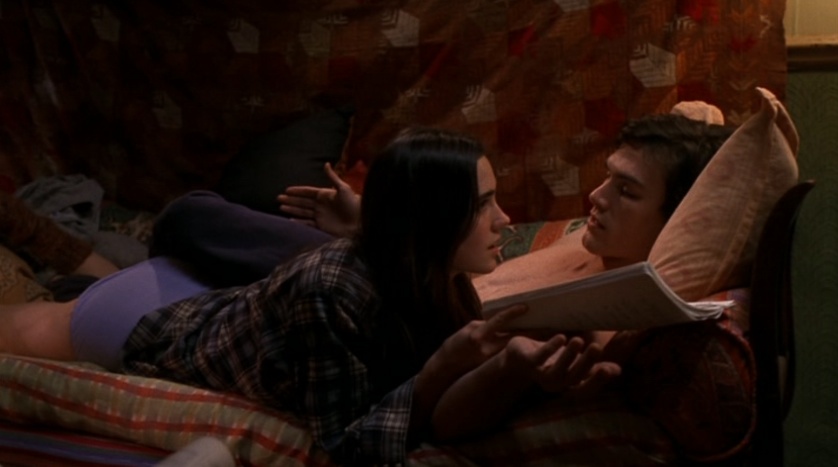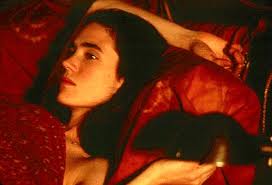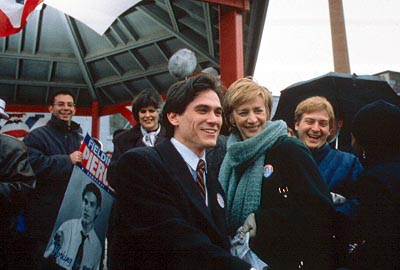From the Chicago Reader (March 24, 2000). — J.R.
Waking the Dead
Rating ** Worth seeing
Directed by Keith Gordon
Written by Robert Dillon
With Billy Crudup, Jennifer Connelly, Molly Parker, Janet McTeer, Paul Hipp, Sandra Oh, and Hal Holbrook.
I can’t make any great claims for Keith Gordon’s fourth feature as a director — a tragic love story that might be described as a political allegory, limited by the affective range of its lead actor (Billy Crudup), who plays a smarmy politician, and by the smudgy articulation of some secondary details. Yet the movie has a quality and intensity of feeling that provoke respect and a sense of fellowship — something that makes me cherish some of its attributes.
I can cite only one unequivocal reason for seeing Waking the Dead, and that’s Jennifer Connelly, who plays Sarah Williams — a Catholic activist who, when the story opens, seemingly dies when the car she and two pro-Allende Chileans are driving through Minneapolis is bombed. What makes Connelly so remarkable isn’t her character’s radicalism but her capacity to keep the character fresh every time she appears and to leave a lingering impression that makes the hero’s (and the movie’s) sense of loss acute. I know this doesn’t sound like much, because if the film didn’t give us Connelly in such carefully measured increments and didn’t shape scenes to depend on her absence as much as other scenes depend on her presence, she wouldn’t have the same impact. (To create this sense of her, Gordon cleverly relies on the viewer’s imaginative participation and on a certain amount of ambiguity; the closing credits inform us that one of Sarah’s “appearances” in another character’s flashback is played not by Connelly but by the film’s production designer, Zoe Sakellaropoulo.)
Sarah reminds me of Harry Lime (Orson Welles), a charismatic embodiment of evil in The Third Man, the screenplay for which was written by Graham Greene — though she is a somewhat saintlike martyr, certainly not a stand-in for Lucifer. This is partly because the desperate Catholic romanticism of another Greene project, The End of the Affair, breathes through Waking the Dead and partly because both it and The Third Man know how to parcel out their mystery figures in discrete installments. However, most of The Third Man is taken up with either preparations for or side effects from Lime’s much-delayed entrance, whereas Waking the Dead, which is structured achronologically, keeps returning to Sarah as a subject, whether she’s present or absent in the movie’s current time frame. In both films it’s the pathos and inadequacy of the putative hero, fancy name and all — Holly Martins (Joseph Cotten) in The Third Man, Fielding Pierce (Crudup) here — that throw the other main figure’s character into bold relief. (Fielding’s fancy name, Sarah notes at one juncture, points to his working-class parents’ outsize ambitions for him.)
The story unfolds over a decade, which begins with Fielding’s first encounter with Sarah in 1972 and ends with his ambiguous encounter with her or her ghost or simply her memory in 1983, nine years after her death has been reported on TV. He’s a working-class Coast Guard officer determined to become president of the United States when he first meets Sarah, who’s working as an assistant to his brother Danny (Paul Hipp), a hippie publisher; 11 years later, Fielding has finally become a senator. The movie mainly ricochets between these two portions of his career to show us the profound impression Sarah makes on his life when, despite their political and temperamental differences, they become lovers. (During most of their time together he’s a college student and she’s an activist.)
All four of Keith Gordon’s features are adaptations of novels — by Robert Cormier (The Chocolate War), William Wharton (A Midnight Clear), Kurt Vonnegut (Mother Night), and now Scott Spencer (Waking the Dead). If Mother Night strikes me as the least successful of the bunch, this may be simply because it’s the only one of these novels I’ve read. Gordon started out as an actor — playing the lead in Home Movies and Christine, the young Roy Scheider in All That Jazz, Angie Dickinson’s son in Dressed to Kill, and Rodney Dangerfield’s son in Back to School. But as a writer-director he seems less influenced by his acting experience than by Stanley Kubrick.
Though Gordon takes no writing credit for Waking the Dead, he was commissioned to write a screenplay based on the Spencer novel nearly a decade ago. The project expired due to a lack of enthusiasm on the studio’s part, but it was recently resuscitated by Jodie Foster, who had seen Mother Night and became the executive producer for Waking the Dead. The apparent Kubrick influence — most evident in Gordon’s first two pictures — can be seen in Gordon’s craft in assembling his screenplays, his gravitation toward military subjects, and his essentialism, his ability to reduce a story to its bare bones.
Gordon seems to part company with Kubrick in eschewing a cynical marketing strategy for promoting his pictures. Kubrick often functioned as a two-headed beast, combining absolute integrity as an artist with apparent contempt for the public when it came to promoting his wares. There’s a barely acknowledged taboo in pop culture against criticizing anyone for deceitful moneygrubbing — which protects such industry standard-bearers as Steven Spielberg — and a willingness to tolerate the transfer of that criticism to other areas; as a consequence, Kubrick currently appears to be in low esteem for his artistic strategies on Eyes Wide Shut but not for his marketing strategies, which included encouraging the public to think that the movie featured sex between Tom Cruise and Nicole Kidman — a deception that clearly warrants criticism. (Similarly, Kubrick’s initial decision to promote The Shining as the most terrifying horror movie ever made understandably caused a lot of backlash, until the public eventually learned to adjust its expectations.)
By contrast, one of the most striking things about the conception and promotion of Waking the Dead is that there was absolutely no commercial reason the movie had to be made, apart from Gordon’s clear emotional attachment to the project. Personal reasons as opposed to business reasons also seem to account for the preponderance of scenes that take place in the snow — the film was shot in Montreal — and the whiteouts (as opposed to blackouts) that commonly figure between scenes.
Gordon’s good sense of editing is apparent in his jump cuts and in a montage devoted to Fielding’s senatorial campaign, and his ability to establish emotional continuity over multiple time shifts calls to mind another filmmaker who’s been at least as widely misunderstood as Kubrick, Alain Resnais. Resnais has been erroneously regarded as a cold and cerebral filmmaker for most of his career, but it’s above all the power of Proustian emotions to bridge disparate time frames and levels of reality, memory, and imagination that characterizes his work, from Hiroshima, mon amour to Last Year at Marienbad to Muriel, and from Je t’aime, je t’aime to Providence to Mélo. There’s nothing in Waking the Dead to approximate the achievements of either Kubrick or Resnais, but its virtues are still genuine and durable enough to resist the blandishments of hype.
By the same token, Jennifer Connelly’s glorious performance has little in common with Michael Douglas’s in Wonder Boys, insofar as there’s nothing about it that can build a resume or cop an Oscar nomination. It’s acting, not studio-based lobbying. An early exchange between Sarah and Fielding has the sort of banality that counts for nothing on the page but quivers with reality on the screen, thanks to Connelly’s precise emotional reading. Sarah: “You can’t be everything to me.” Fielding: “I want to be.” Sarah: “Oh dear…I love that you said that.” If this is soap opera, Waking the Dead makes the most of it.




